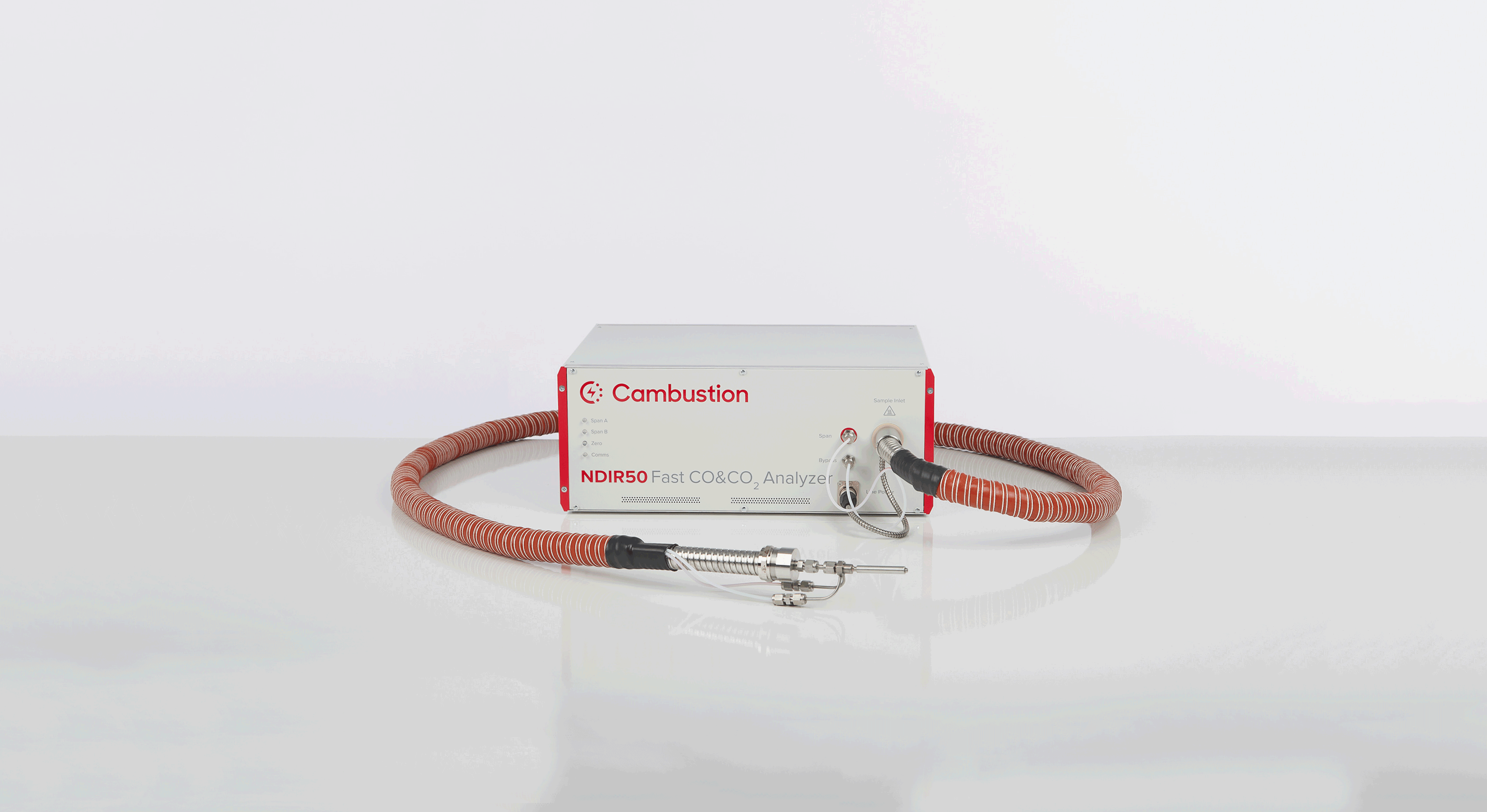CO & CO₂ Analysers
Conventional NDIR 1-2 second response time
Cambustion Fast NDIR >8 millisecond response time
NDIR measurement is a widely used technique for the detection and quantification of gases, particularly in industrial and environmental applications. This method is based on the principle that molecules absorb specific wavelengths of infrared light, and the amount of absorption can be used to determine the concentration of the gas.
Conventional NDIRs have response times of 1-2 seconds, and are typically used to measure “bag emissions” where the concentration changes very slowly. Cambustion's fast NDIRs allow CO and CO2 at measurements at up to 125 Hz. This gives full resolution of short lived transients such as tip-ins or even individual firing cycle events at lower engine speeds.
A need for fast emissions analysers
During the 1-2 seconds it takes a conventional NDIR to respond, an engine will undergo many firing cycles. The conditions inside the combustion chamber can vary significantly between successive firing cycles- particularly when the engine conditions are changing rapidly such as during engine start or speed/load transients. Cambustion fast NDIRs have a time response as low as 8 ms T10-90. This allows the analysers to distinguish between two adjacent firing cycles, and even offer information about the variation in CO & CO2 concentration during a single exhaust stroke.
In addition, for applications where gas concentration needs to be controlled or regulated, a fast response NDIR sensor can help maintain stable conditions by quickly responding to changes and providing feedback to control systems.
Benefits of fast emissions analysers
Accurate measurement of exhaust emissions brings valuable insights into engine operation, and assists calibration engineers in reducing the engine out emissions. This can assist in emissions compliance while reducing after-treatment costs. The fast NDIR50 is carefully designed and calibrated to be linear to well above expected engine engine out levels (e.g. 0-20% range) while still retaining impressive sensitivity.
Rapid and accurate control of engine lambda during transients such as cold start, or gear changes can lead to improved drivability and reduced emissions. Improving the engine calibration can minimise CO breakthroughs across a 3-way catalyst, thus helping compliance with the latest emissions regulations such as Euro 7.
Cambustion COx Analyser Range
Ultra-sensitive CO & CO₂ Analyser
New in 2024 is the NDIR5 ultra-compact NDIR designed for non-engine single channel applications where a 100 ms T10-90 response time is sufficient. The NDIR5 is capable of both [CO] and [CO₂] measurement directly with only a power supply required.
This latest system is fitted with a long absorption path length and is therefore optimised for low concentration simultaneous CO and CO₂ measurement. Sub single digit ppm detection limits are capable while still retaining a market-leading 100ms time response. Portability is a key feature of the NDIR5, with a carrying handle allowing for mobile and ambient applications.
The NDIR5 does not have a heated line, and is only suitable for sampling non-condensing gas such as those in process control, ambient air quality or carbon capture applications.
Find out moreCompact single-channel fast NDIR for CO and CO₂
New in 2022 is the NDIR50 compact NDIR designed for both engine and non-engine single channel applications where a 15 ms T10-90 response time is sufficient. The NDIR50 is capable of both [CO] and [CO₂] measurement directly with only a power supply required.
Find out moreAutomotive Twin Channel CO & CO2 analyser
Using a non-dispersive infra-red detector, Cambustion fast NDIR analysers offer CO&CO₂ measurements at up to 125Hz. This enables transient measurement of true combustion lambda (unaffected by excess hydrocarbons), EGR rate and more...
Find out moreApplications
In many applications, it is crucial to have a fast response time to detect and respond to changes in gas concentrations quickly. For example, in engine applications, fast response time is essential to monitor exhaust gases accurately and adjust fuel injection and combustion parameters for optimal performance, emissions control, and engine protection. A slow response time in this case could lead to poor fuel economy, higher emissions, and legislative exceedances.
The portable NDIR50 analyser can be used for on-site monitoring of gas concentrations in various environments, such as industrial facilities, in process control, and other settings. The portability of the NDIR50 allows for quick and easy testing without the need for larger laboratory equipment, reducing testing time and costs. This makes the portable NDIR50 analysers ideal for use in mobile testing labs, fieldwork, and emissions monitoring of engines, vehicles, and other equipment.
The ability to detect low levels of gas concentrations is critical in some applications, such as air quality monitoring and control, where even a slight increase in pollutants can have significant health and environmental impacts. A fast response and portable NDIR sensor can detect low-level gas concentrations quickly and accurately, enabling prompt action to be taken to mitigate the effects of pollutants. CO2 can be used as a reference gas at the roadside, to enable quantification and estimation of vehicle each passing vehicles emission performance when combined with our CLD50 NOx sensor.
The NDIR500 and NDIR50 are available with support for AK protocol, allowing easy integration with the test bench for improved test reliability and reduced workload.
For more information see Applications and Sample data.
Key Application Notes
| Title | Data Type | Download File | Size | Last Updated | |||||
|---|---|---|---|---|---|---|---|---|---|
| Title | Flame Traverse Sampling | Data Type | Application note | Download File | cld06v01-fast-gas-analysis-traversing-a-methane-flame.pdf | Size | 1.69 MB | Last Updated | |
| Title | Mobile CO&CO2 measurement on-board a diesel vehicle | Data Type | Application note | Download File | ndir11v01-mobile-co-co2-diesel.pdf | Size | 461.45 KB | Last Updated |
Need more information? Connect to an expert
